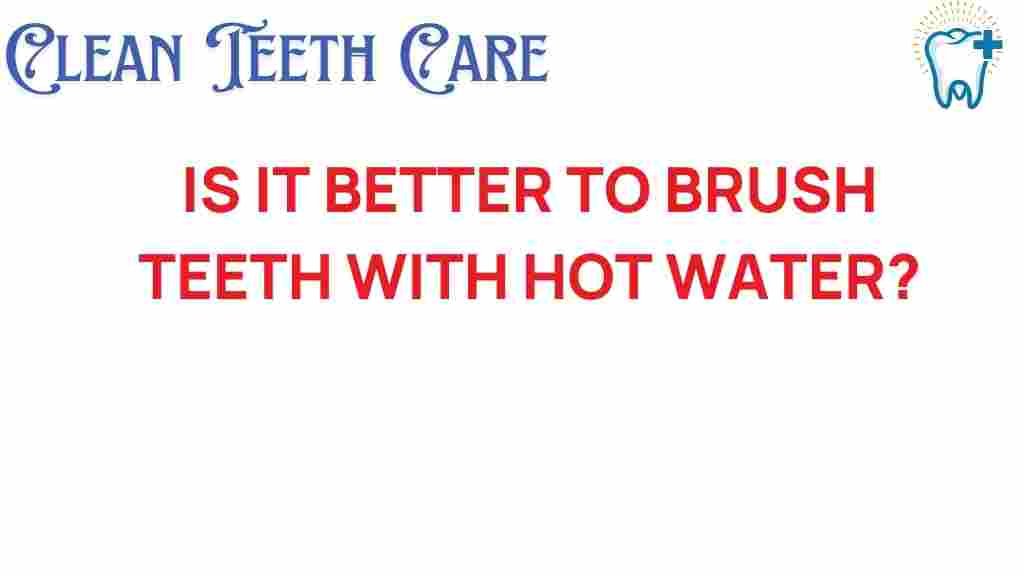Brushing Teeth with Hot Water: Surprising Effects on Dental Hygiene
When it comes to maintaining optimal dental hygiene, the temperature of the water used while brushing can often be overlooked. Many people are unaware of the surprising effects that brushing teeth with hot water can have on their oral care routine and overall tooth health. In this article, we will explore the impact of temperature on your teeth and gums, delve into proper techniques for brushing, and provide dentist advice on maintaining effective oral hygiene practices.
The Science Behind Water Temperature and Oral Care
The temperature of the water used during brushing teeth may seem trivial, but it can significantly influence your oral care routine. Here are some key points regarding the relationship between water temperature and dental health:
- Sensitivity: Hot water can exacerbate tooth sensitivity, particularly for those with already compromised enamel or dental work.
- Gum Health: The heat from hot water can irritate sensitive gum tissue, potentially leading to discomfort or inflammation.
- Effectiveness: The effectiveness of toothpaste can vary with temperature; certain compounds may break down or become less effective when exposed to high heat.
Understanding Proper Technique in Brushing Teeth
To maximize the benefits of your brushing routine, it’s essential to understand the proper technique. Here’s a step-by-step guide to brushing your teeth effectively:
- Choose the Right Toothbrush: Use a soft-bristled toothbrush to minimize gum irritation.
- Use Lukewarm Water: Instead of hot water, opt for lukewarm water. This is gentle on your gums and teeth while still effective for rinsing.
- Apply Toothpaste: Use a fluoride toothpaste to help protect against cavities.
- Brush Gently: Position your toothbrush at a 45-degree angle to your gums and use gentle, circular motions.
- Brush for Two Minutes: Make sure to brush for a full two minutes, covering all surfaces of your teeth.
- Rinse Thoroughly: After brushing, rinse your mouth with lukewarm water to wash away any remaining toothpaste.
Potential Risks of Using Hot Water
While some may believe that using hot water can enhance the cleaning power of toothpaste, the risks often outweigh the benefits. Here are some potential drawbacks:
- Damage to Tooth Enamel: Hot water can soften tooth enamel temporarily, making it more susceptible to wear and damage.
- Increased Sensitivity: As mentioned earlier, hot water can worsen tooth sensitivity, especially for those with existing dental issues.
- Gum Damage: The heat can lead to irritation or even burns on sensitive gum tissue.
- Reduced Efficacy of Toothpaste: Some active ingredients in toothpaste may not perform as well at high temperatures.
Dentist Advice on Water Temperature and Brushing
Dental professionals often emphasize the importance of using lukewarm water for brushing teeth. Here are some recommendations from dentists:
- Use Lukewarm Water: Aim for water that is comfortable to the touch—not too hot or too cold.
- Focus on Technique: Prioritize brushing technique over temperature. Proper brushing methods will yield better results regardless of water temperature.
- Regular Dental Checkups: Schedule regular visits to your dentist to assess your oral health and receive personalized advice.
Addressing Tooth Sensitivity
If you experience tooth sensitivity when brushing, it’s essential to address the issue promptly. Here are some troubleshooting tips:
- Switch Toothpaste: Consider using toothpaste designed for sensitive teeth.
- Adjust Technique: Brush more gently and avoid aggressive scrubbing.
- Consult Your Dentist: If sensitivity persists, consult your dentist to rule out underlying issues.
Maintaining Optimal Dental Hygiene
To ensure your dental hygiene practices are effective, follow these additional tips:
- Floss Daily: Incorporate flossing into your routine to remove plaque and food particles from between teeth.
- Mouthwash: Use an antimicrobial mouthwash to help reduce plaque and prevent gum disease.
- Stay Hydrated: Drink plenty of water throughout the day to keep your mouth moist and help wash away food particles.
Conclusion: Finding the Right Balance in Oral Care
In summary, the temperature of the water used for brushing teeth can have surprising effects on your oral care routine. While hot water might seem like an effective choice, it can lead to increased tooth sensitivity and potential damage to your enamel and gums. Instead, sticking to lukewarm water is advisable for maintaining optimal tooth health and ensuring effective brushing.
By understanding the importance of proper technique, addressing any sensitivity issues, and following dentist advice, you can enhance your dental hygiene routine and protect your smile for years to come. For more information on oral care, visit The American Dental Association for professional guidelines.
Make sure to explore our other articles on dental health and hygiene tips to further improve your oral care routine!
This article is in the category Hygiene and created by CleanTeethCare Team
